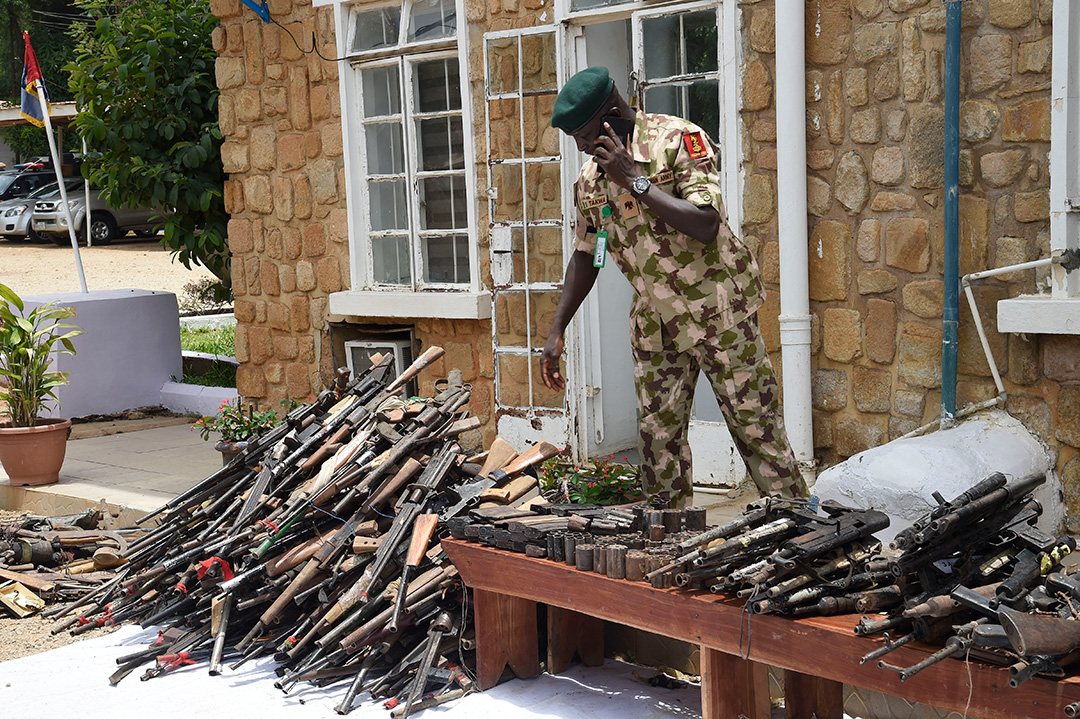African Security Leaders Seek Ways to Stop Flow of Illicit Small Arms and Light Weapons
ADF STAFF
African security officials are joining the global effort to end the flow of illicit small arms and light weapons that drive so much of the violence plaguing nations across the continent.
During gatherings in Nairobi, Kenya, and Lomé, Togo, security chiefs helped lay the foundation for an international strategy to control the movement of small arms and light weapons (SALW) to reduce their availability.
“The illicit trade in small arms knows no borders and respects no laws, making it imperative for us to strengthen our collaborative efforts at both regional and international levels,” Kenya’s Interior Principal Secretary Raymond Omollo told a regional meeting ahead of the United Nations’ Fourth Review Conference in June aimed at developing a system for identifying and tracing SALW.
The Fourth Review Conference will focus on implementing the U.N.’s 2005 International Tracing Instrument that calls for each SALW armament to carry unique identification details and for nations to keep records of weapons within their borders.
Kenya’s experience shows the severity of Africa’s SALW problem and also offers a possible solution.
According to the Kenyan government, most of the weapons entering Kenya’s illegal market trickle in from neighboring countries through small-time traders. Through shared intelligence and multi-agency cooperation, Kenya’s national security agencies have reduced the threat from SALW and are often ahead of the criminals, according to a government report presented to the U.N. Office on Drugs and Crime.
The upcoming international conference will be the latest attempt to quell the influence of SALW in Africa. Continental leaders have crafted at least a half-dozen regional or continentwide protocols, conventions or roadmaps aimed at stifling SALW, starting with the African Union’s Bamako Declaration on an African Common Position on the Illicit Proliferation, Circulation and Trafficking of Small Arms and Light Weapons in 2000.
The most recent effort, passed in Lusaka, Zambia, in 2016, declared its intention “to silence the guns of Africa” by 2020. Christopher Kayoshe, acting head of the AU’s Disarmament, Demobilization and Reintegration/Security Sector Reform Division, told the Nairobi conference the goal of “silencing the guns” has been delayed to 2030.
The U.N. says that African nations are awash in more than 40 million illicit small arms and light weapons, most of them imported. Almost 80% are unregistered and unmarked, making them difficult for investigators to track, according to the AU Commission and Small Arms Survey.
Small arms are defined as weapons, such as rifles or pistols, that can be carried and operated by a single person. Light weapons include mortars and anti-aircraft guns and similar human-portable arms that require a crew of two or more operators.
Experts say that SALW armaments are fueling many of the conflicts across Africa, from insurgencies in the Sahel, to more than 100 groups fighting for territory in the eastern Democratic Republic of the Congo, to banditry and territory disputes in Kenya, Nigeria, and beyond.
“In this geopolitical landscape fraught with multi-layered risks, illicit proliferation, diversion and misuse of small arms and light weapons is a major contributing factor that perpetuates much of the human suffering we see in the world,” Izumi Nakamitsu, the U.N.s disarmament chief, told the Nairobi conference.
Porous borders and lax enforcement make it easy for weapons to flow from country to country and group to group, according to security officials. For that reason, experts say, tighter borders and greater cross-border cooperation must be part of the plan to slow the flow of SALW.
AU officials are discussing a policy to ensure that the continent takes a unified approach to the proliferation of SALW. The program requires money and new technology for tracing weapons from source to end-users, they say.
Security chiefs at the Nairobi conference are looking at technological proposals that can enhance the process of tracking weapons back to their source and separating illicit weapons from legitimate ones.
“Small and light weapons continue to wreak havoc in communities, fuel conflict, undermine peace and stability, and hinder socioeconomic development in the African continent,” Omollo added.


Comments are closed.